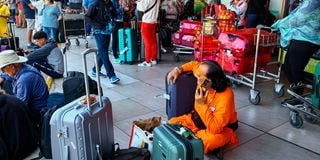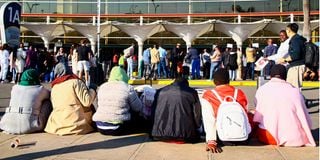Premium
Aviation workers' strike sends shockwaves through travel, export industries

Stranded travellers at the Jomo Kenyatta International Airport following a strike by the Kenya Aviation Workers on September 11, 2024.
What you need to know:
- Operations of fresh produce exporters have been brought to a standstill by the strike.
- The travel industry has also booked losses running into millions due to the strike.
The strike by airport workers across the country has significantly rattled private sector businesses relying on the aviation industry to operate, most of which are now counting losses running into millions of shillings.
Industry associations of fresh produce exporters and travel agents told Nation that their operations have been brought to a standstill by the disruption at the main airports, causing unprecedented losses.
The Fresh Produce Exporters Association of Kenya (FPEAK), which constitutes businesses that sell fresh cut flowers, fruits and vegetables to foreign countries, estimates that its members will cumulatively lose approximately Sh410 million each day of the strike, added to the reputational damages stemming from the inconvenience caused to their clients.
“The industry exports between 600 and 800 tonnes of fresh produce every day through cargo and passenger flights and if the staff of KAA are not working it means we cannot move cargo. This is a serious disruption that affects our business,” FPEAK chief executive officer Hosea Machuki told Nation.
Mr Machuki said that in addition to the monetary losses, the strike is also already straining their relationship with their clients abroad, which could lead to loss of business and subsequent loss of jobs and livelihoods to those relying on the industry’s value chain.

Stranded travellers read novels as they await clearance at JKIA Terminal 1C following a strike by Kenya Aviation Workers on September 11, 2024.
“We have requested the government to find a way to let cargo move as they still work to resolve the strike with the workers, because the industry will lose a lot of money. That is foreign exchange lost. Those are jobs that will be at risk,” he said.
At the same time, the travel industry has also booked losses running into millions due to the strike, with the Kenya Association of Travel Agents (Kata) estimating that the single day of the strike cost them at least $16,000 (Sh2.06 million) in ticket sales alone.
Kata CEO Nicanor Sabula told the Nation that the strike has completely snarled up the industry and the lobby’s members will have to cough out millions of shillings in compensation fees for clients inconvenienced by a phenomenon not of their own making.
“Our members, the travel agents, have been greatly affected because a lot of them had booked their clients to travel to various destinations both domestic and international,” Mr Sabula said.
“We are now starting to deal with very angry clients that we cannot assure when they’re going to travel. This is going to cause us a lot of problems because some of those cancelled flights, there’s compensation that will need to be paid.
“What we’re seeing in the market is completely chaotic and our members are unable to deal with the influx of complaints from their clients.”

Stranded travellers await clearance at JKIA terminal 1A following a strike by Kenya Aviation Workers on September 11, 2024.
Hospitality industry experts also say the strike portends a storm for the tourism industry and economy in general, as it paints the country in bad light for stranded travellers and potential future travellers and tourists.
Former chairman of the Kenya Tourism Federation (KTF) Mohammed Hersi said the strike, which could have been avoided, has set the country’s tourism industry back by years and should be resolved as soon as possible.
“We’re not predictable. This is not the first time we’re having this disruption. If every now and then there’ll be a disruption, why would you bring a meeting to Nairobi, Mombasa? We’re forgetting we’re not the only ones,” Mr Hersi told the Nation.
The industrial action by the Kenya Aviation Workers Union (Kawu) is in protest of the intended lease of the Jomo Kenyatta International Airport (JKIA) to Indian conglomerate Adani group, a move which they say will cause mass layoffs for local airport workers.
Industry lobby groups relying on the aviation industry said they were unprepared for the disruption as the Kenya Airports Authority (KAA) had assured them that the matter would be resolved before it escalates to an industrial action.





